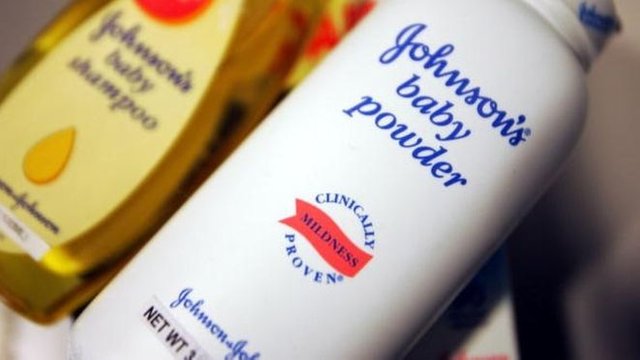Johnson & Johnson faces $417m payout in latest talc case

Johnson & Johnson has been ordered to pay $417m (£323.4m) to a woman who says she developed ovarian cancer after using products such as baby powder.
The California jury's decision marks the largest award yet in a string of lawsuits that claim the firm did not adequately warn about cancer risks from talc-based products.
A spokeswoman for Johnson & Johnson defended the products' safety.
The firm plans to appeal, as it has in previous cases.
"We will appeal today's verdict because we are guided by the science," Carol Goodrich, spokesperson for Johnson & Johnson Consumer Inc, said in a statement.
The evidence around any link between talc use and cancer is inconclusive.
Blood tests spot ovarian cancer early
Johnson & Johnson, headquartered in New Jersey, faces thousands of claims from women who say they developed cancer due to using the firm's products to address concerns about vaginal odour and moisture.
Johnson & Johnson has lost four of five previous cases tried before juries in Missouri, which have led to more than $300m in penalties.
The California lawsuit was brought by Eva Echeverria, a 63-year-old woman who said she started using baby powder when she was 11 years old. She was diagnosed with ovarian cancer 10 years ago; the diagnosis is terminal, according to lawyers working on the case.
The lawsuit alleged that the company was aware of cancer risk associated with talcum powder, but concealed that information from the public.
The verdict included $70m in compensatory damages and $347m in punitive damages.
Grey line
Analysis: James Gallagher, health editor, BBC news website
Is talc safe?
There have been concerns for years that using talcum powder, particularly on the genitals, may increase the risk of ovarian cancer.
But the evidence is not conclusive. The International Agency for Research on Cancer classifies talc used on the genitals as "possibly carcinogenic" because of the mixed evidence.
Why is there any debate?
The mineral talc in its natural form does contain asbestos and does cause cancer, however, asbestos-free talc has been used in baby powder and other cosmetics since the 1970s. But the studies on asbestos-free talc give contradictory results.
It has been linked to a cancer risk in some studies, but there are concerns that the research may be biased as they often rely on people remembering how much talc they used years ago. Other studies have argued there is no link at all and there is no link between talc in contraceptives such as diaphragms and condoms (which would be close to the ovaries) and cancer.
Also there does not seem to be a "dose-response" for talc, unlike with known carcinogens like tobacco where the more you smoke, the greater the risk of lung cancer.
What should women do?
The charity Ovacome says there is no definitive evidence and that the worst-case scenario is that using talc increases the risk of cancer by a third.
But it adds: "Ovarian cancer is a rare disease, and increasing a small risk by a third still gives a small risk. So even if talc does increase the risk slightly, very few women who use talc will ever get ovarian cancer."
Source:
http://www.bbc.com/news/business-41003540
@cyberwatch666
Resteem. Upvote. Follow.
WOW! I can't think of a single person that I know who hasn't used this product. My goodness! Thanks for sharing this info!
you're welcome.